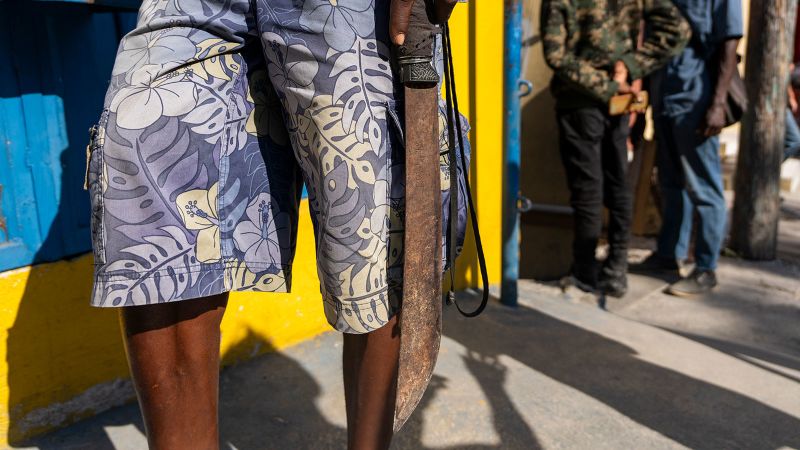A woman hustles her young child into a waiting car, half-dragging him as she shields his eyes. Other family members follow with heavy suitcases, averting their eyes too. They’re leaving the city, even though the drive through gang-controlled roads is risky.
The reason lies in the street before their house: A burned corpse; the remains of a suspected gang member killed by their neighbors. His knees are bent and torso pitched forward as if in supplication, metal wires wrapped around the charred flesh. This is the fourth such corpse CNN has seen in two days.
Just up the hill, another mother is rushing toward a waiting helicopter holding her infant. Eyewitnesses tell CNN that she left her car seat behind, urged to move quickly by armed guards. The unauthorized helicopter landing is attracting attention; video of the flight shows a fight breaking out on the ground as the chopper lifts off.
They’re fleeing anarchy. Until yesterday, people like these were the holdouts; the ones who had a choice but stayed until Port-au-Prince became unbearable. Now even they are leaving amid an unprecedented frenzy of terror in the Caribbean nation.
For three weeks, Haiti’s capital has been trapped in a gory cycle that far exceeds the kidnapping and gang violence for which it was already known. An insurgent league of heavily armed gangs is waging war on the city itself, seeking new territory and targeting police and state institutions. Scared and angry, vigilante groups are blocking off their neighborhoods with felled trees and chains, killing and burning outsiders suspected of gang membership. It’s the only way, they say, to defend themselves.
Human remains are lying in the streets, yet the multinational security mission long touted by Haiti’s neighbors as a game-changer for its gang problem is nowhere to be found.



This is the best summary I could come up with:
It’s been nearly 18 months since Prime Minister Ariel Henry first requested foreign military assistance, a period in which the gangs steadily expanded their reign of terror across an estimated 80% of the city.
Leslie Voltaire, a candidate for the transitional council, told CNN Thursday that he was frustrated with how long the political process was taking while gangs gained territory.
The reopening of Haiti’s port and airport could happen within the first 100 days, he said – a potentially long wait in a country where nearly half the population doesn’t have enough to eat, according to the World Food Programme.
Haiti’s Ministry of Communications buildings is itself overrun by refugees fleeing gang attacks – in its front office, hungry children now sit on the floor and swing on rolling desk chairs.
Security and humanitarian issues in this city are tightly intertwined; experts say that the nation’s immediate need for clean water and food mean the focus must be on bringing Port-au-Prince’s port and airport back online.
Enslaved people in Haiti overthrew brutal French colonial rule and founded the world’s first free Black republic in 1804, only to be shunned by the international community for decades.
The original article contains 1,332 words, the summary contains 196 words. Saved 85%. I’m a bot and I’m open source!